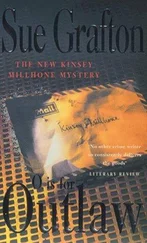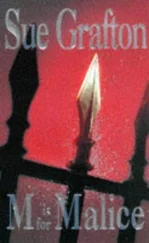“When he first showed up looking for a room, did he fill out an application?”
“He did, but after three years, I destroy them. I have enough paper cluttering my life. Truth is, I’m mighty careful about my tenants. If I’d thought he was a man of low character, I’d have turned him down, whether he’d been in prison or no. As I recall, he listed no personal references, which struck me as odd. On the other hand, he was clean and well spoken, clearly intelligent. He was also gentle by nature, and I never heard him swear.”
“I guess if he had something to hide, he’d be too smart to put it on an application.”
“That’d be my guess as well.”
“I understand he was chummy with a guy on the second floor. You mind if I talk to him?”
“Talk to anyone you like. If Mr. Downs had been honorable about giving notice, I’d have kept my observations to myself.” She paused to look at her watch. “Now unless you need something more, I’d best get on with my day.”
“What’s the name of the gentleman in room number five?”
“Mr. Waibel. Vernon.”
“Is he in?”
“Oh, yes. He lives on his disability checks and seldom goes out.”
Vernon Waibel was a bit more friendly than Melvin’s third-floor neighbor, who’d shut the door in my face. Like Downs, Waibel was in his fifties. He had dark brows and dark eyes. His gray hair was thinning and shaved close, as though to anticipate the baldness to come. Like someone facing chemotherapy, he preferred taking charge of the hair loss himself. His skin was tawny, his neck creased from exposure to the sun. He wore a multicolored cotton sweater in earth tones, chinos, and moccasins without socks. Even the tops of his feet were brown. I wondered how he managed to tan if he seldom went out. I saw no evidence of disability, but that wasn’t my concern.
I went through the usual, hi-how-are-you stuff. “I hope I’m not disturbing you.”
“Depends on what you want.”
“I understand Mr. Downs moved out. You have any idea where he went?”
“You a cop?”
“Private detective. He was supposed to be deposed as a witness to an automobile accident and I need to track him down. He’s not guilty of wrongdoing. We just need his help.”
“I got a little time to talk if you want to come in.”
I thought about Juanita Von’s rule about no women visitors in a tenant’s room with the door shut. She and I were such good friends by now I thought I’d risk her disapproval. “Sure.”
He stepped back and I passed in front of him. His room was not as large as Downs’s, but it was cleaner and it had a lived-in feel to it. The furnishings had been augmented with personal items: two plants, a sofa with throw pillows, and a quilt folded over the iron bedstead. He gestured toward the only upholstered chair in the room. “Take a seat.”
I sat down and he settled on a plain wooden chair nearby. “You the one put that flyer out about him?”
“You saw that?”
“Yes, ma’am. I did and so did he. Made him nervous, I’ll tell you that.”
“Is that why he left?”
“He was here and now he’s not. Draw your own conclusions.”
“I’d hate to think I was the one who scared him away.”
“I can’t speak to that, but if you’re here to ask questions, you might as well get to ’em.”
“How well did you know him?”
“Not well. We watched television together, but he never said much. Nothing personal, at any rate. We’re both fans of that channel that runs the old movie classics. Lassie, Old Yeller, The Yearling-things like that. Stories that broke your heart. That’s about all we had in common, but it was enough.”
“Did you know he was leaving?”
“He didn’t consult me, if that’s what you mean. Neither one of us was looking for a friend, just someone who wouldn’t hog the TV when we were hell-bent on hogging it ourselves. Shane was another movie he liked. Times we’d be sitting there bawling like babies. Pitiful, but there you have it. Feels good to have a reason to let it all hang out.”
“How long have you known him?”
“The five years since he moved in.”
“You must have learned something about the man.”
“Surface stuff. He was good with his hands. TV went on the blink, he’d tinker until he got it up and running again. He had a knack for anything mechanical.”
“For instance?”
He thought briefly. “The grandfather clock in the parlor quit running and Mrs. Von couldn’t find anyone to come take a look. She had a couple of numbers for clock-repair guys, but one was dead and the other had retired. Melvin said he wouldn’t mind having a go at it. Next thing you know he had it working again. I’m not sure he did us any favors. Middle of the night, I can hear it all the way up here. Times I can’t sleep, I count every chime. Four times an hour-it’s enough to drive me insane.”
“What’d he do for a living?”
“Beats me. He didn’t volunteer information of that type. I live on disability so maybe he thought I’d feel bad, him working and me not. He was paid in cash, I know that much, so it might have been something under the table.”
“Someone suggested yard work or maybe household repairs.”
“I’d say more skilled, though I couldn’t tell you what. Small appliances, electronics, something like that.”
“What about family?”
“He’d been married once upon a time because he mentioned his wife.”
“You know where he was from?”
“Nope. He did say he had some money saved and he had his eye on a truck.”
“I didn’t think he drove. Why else would he take the bus back and forth across town?”
“He had a license, but no vehicle. That’s why he was in the market for one.”
“Sounds like he meant to hit the road.”
“Might have.”
“What about the tattoo on his hand? What was that about?”
“He was an amateur ventriloquist.”
“I don’t get the connection.”
“He could throw his voice, like that Señor Wences guy on the old Ed Sullivan Show. He’d flatten his thumb along his index finger and make it move like a mouth. The red in the web between his index finger and his thumb were the lips and the two dots on the knuckle were the eyes. He made like she was a little pal of his named Tía-“Auntie” in Spanish-the two of them talking back and forth. I only saw him do it once, but it was funny. I found myself talking to her like she was real. I guess everybody’s got a talent of some kind, even if it’s an act you lifted from someone else.”
“Had he been in prison?”
“I asked him about that once. He admitted he served time, but he wouldn’t say what for.” He hesitated, easing a sly peek at his watch. “I don’t mean to cut you short, miss, but I got a program about to come on and if I don’t get down there, the other fellows on the floor will be all over the set.”
“I think that about covers it. If you think of anything else, could you give me a call?” I found a business card in my bag and gave it to him.
“Sure thing.”
We shook hands. I slung my bag across one shoulder and moved to the door. He stepped ahead of me and opened it like a gent.
He said, “I’ll just follow you down the hall since I’m headed that way.”
We’d nearly reached the landing when he said, “If you want my opinion?”
I turned and looked at him.
“I’d bet you dollars to doughnuts, he didn’t leave town.”
“Why?”
“He had grandsons.”
“I heard he wasn’t allowed to see them.”
“Doesn’t mean he didn’t find a way.”
As it turned out, the investigator for the Tri-Counties Agency for the Prevention of Elder Abuse was the very same Nancy Sullivan I’d spoken to on the phone, which I learned when she appeared in my office on Friday afternoon. She must have been in her twenties, but she looked a scant fifteen. Her hair was shoulder-length and straight. She had a plain, earnest air about her, leaning forward slightly in her chair, feet together, while she explained what she’d learned in the course of her investigation. The jacket and midcalf skirt she wore looked like they’d been ordered from a travel clothing catalog, a wrinkle-free fabric you could wear for hours on a plane and later wash in a hotel sink. She wore sensible low-heeled shoes and opaque stockings through which I could see evidence of spider veins. At her age? That was troubling. I tried to picture her in a conversation with Solana Rojas, who was so much older, smarter, and wiser in the ways of the world. Solana was cunning. Nancy Sullivan seemed sincere, which is to say clueless. No contest.
Читать дальше












